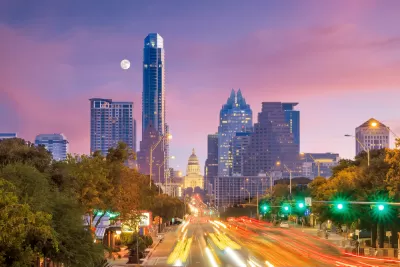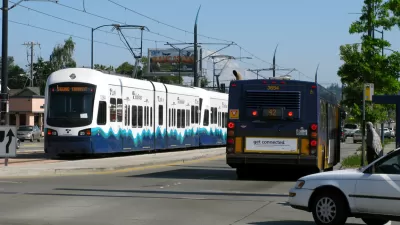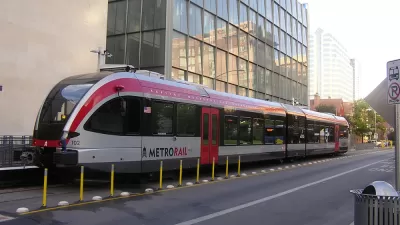Project Connect promises to prioritize equity and inclusion with $300 million dedicated to anti-displacement efforts.

Austin's newly approved $7 billion transit expansion plan boasts an ambitious set of goals that, according to Mayor Steve Adler, meets "so many long-held needs." The project will expand bus and electric bike share services, build a transit tunnel, and install almost ten miles of commuter rail.
While efficient and popular with transportation planners, light rail has a darker connotation for many community activists like Susana Almanza. Almanza, who serves as director of environmental justice organization PODER, worries about the effects of the new transit infrastructure on local communities, citing a history of displacement that frequently follows new rail lines. As transit-adjacency transforms from an undesirable reality to a highly valued urban amenity, low-income communities near rail lines become displaced by luxury housing developments aimed at upwardly mobile workers. An NRDC study of California's major urban areas found that rent for a two-bedroom apartment within a half-mile of a transit stop averaged more than $3,000, well above affordability for most transit-dependent families.
Austin's leaders are addressing these concerns head-on with an equity plan and dedicated budget aimed at helping low-income residents stay in their homes and reducing the negative impacts of rail construction. The budget includes rent subsidies and homeowner assistance to help the communities that rely on transit the most and offset the neighborhood change inevitably brought by new transit infrastructure. As part of the equity plan, the city plans to create a neighborhood-level equity assessment tool and community advisory committee that will monitor performance progress once projects are underway.
FULL STORY: The next challenge for Austin’s transit plan: Delivering on its equity pledge

Montreal Mall to Become 6,000 Housing Units
Place Versailles will be transformed into a mixed-use complex over the next 25 years.

Planetizen Federal Action Tracker
A weekly monitor of how Trump’s orders and actions are impacting planners and planning in America.

DARTSpace Platform Streamlines Dallas TOD Application Process
The Dallas transit agency hopes a shorter permitting timeline will boost transit-oriented development around rail stations.

Without International Immigrants, the Rural US Population Would Be Falling 58%
Census data shows that population growth in rural areas is due in large part to international migrants.

Dead End: Nine Highways Ready for Retirement
The Freeways Without Futures report describes the nation’s most promising highway removal proposals.

Congressman Proposes Bill to Rename DC Metro “Trump Train”
The Make Autorail Great Again Act would withhold federal funding to the system until the Washington Metropolitan Area Transit Authority (WMATA), rebrands as the Washington Metropolitan Authority for Greater Access (WMAGA).
Urban Design for Planners 1: Software Tools
This six-course series explores essential urban design concepts using open source software and equips planners with the tools they need to participate fully in the urban design process.
Planning for Universal Design
Learn the tools for implementing Universal Design in planning regulations.
City of Mt Shasta
City of Camden Redevelopment Agency
City of Astoria
Transportation Research & Education Center (TREC) at Portland State University
City of Camden Redevelopment Agency
Municipality of Princeton (NJ)
Regional Transportation Commission of Southern Nevada





























